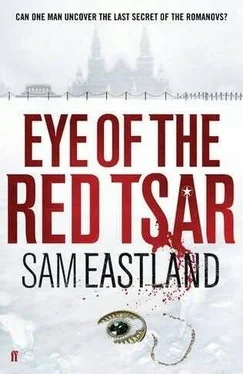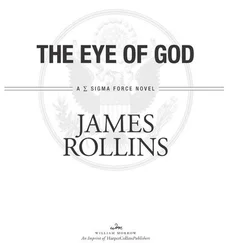Reluctantly, Kirov released his grip. “I think it’s the same person I saw looking in the window that night.”
“And you told me he looked like the Tsar.”
“All right,” Kirov said, “but even if it is Alexei, what the hell is he doing here?”
“That’s exactly what I’m going to find out.”
Kirov nodded, satisfied. “If we agree, then I say we leave as soon as possible. Until we can get him to Moscow, none of us are safe in this house.”
“Anton will remain on watch,” said Pekkala. “He almost opened fire down there in the basement. I don’t want him in the room while we are questioning Alexei.”
THEY BROUGHT ALEXEI INTO THE KITCHEN. ALEXEI SAT ON ONE SIDE of the table, Kirov and Pekkala on the other.
Anton stood outside in the courtyard. He seemed relieved not to be part of the interrogation. After what happened to Mayakovsky, all Anton seemed to care about was getting out of town.
It was the middle of the night.
A lantern rested on the table. Its apricot-colored flame burned steadily, warming the room.
Wind moaned around the piece of cardboard which had been taped over the broken kitchen window.
Alexei looked sickly and disheveled. He had aged beyond his years. His shoulders hunched and he scratched nervously at his arms as he spoke. “They told me you were gone, Pekkala, but I never believed it. When I heard you had turned up in Sverdlovsk, I had to see for myself if it was true.”
“You heard?” asked Kirov. “Who told you?”
“And who are you to speak to me that way?” replied Alexei, flaring.
“I am Commissar Kirov, and as soon as I am satisfied that you are who you say you are, we can begin a civil conversation. Until then, you can answer the questions.”
“There are still people in this town who consider the Romanovs their friends,” said Alexei.
Kropotkin, thought Pekkala. The police chief must have known all along where Alexei was hiding.
“Excellency-” began Pekkala.
“Don’t call him that,” snapped Kirov. It was the first time he had raised his voice to Pekkala.
“He’s right,” said Alexei. “Just call me by my name.” With the heel of his palm, he wiped the tears out of his eyes.
“We found your parents, Alexei,” Pekkala told him, his face haggard and serious. “Your sisters, too. As you probably know by now, you are the only one who survived.”
Alexei nodded. “That is what I was told.”
“By whom?” demanded Kirov.
“Let him talk!” ordered Pekkala.
“By the people who looked after me,” Alexei told them.
“Start at the beginning,” Pekkala urged him gently. “What happened on the night you were taken from this house?”
“We were down in the basement,” said Alexei. “A man had come to take a photograph of us. We were used to it. Many had been taken since our confinement in Tsarskoye Selo and after that in Tobolsk. He was just about to take his photo when a man in an army uniform burst into the room and started shooting.”
“Did you know him?” asked Pekkala.
“No,” replied Alexei. “The guards were always changing, and there had been so many since our family was placed under arrest. The photographer had set up two bright lights. They were shining in our faces. I could barely see the man and there was only a second before he began shooting. After that, the room filled with smoke. My father shouted. I could hear my sisters screaming. I must have fainted. The next thing I remember, the man was carrying me up the stairs. I struggled, but he gripped me so tightly that I could barely move. He carried me out into the courtyard and made me climb into the front seat of a truck. He said that if I tried to get away I would end up like the rest. I was too terrified to disobey. Several times he went back into the house, and each time he came out he was carrying one of my family. I could see the way their heads hung down, the way their arms were dangling. I knew they were dead. Then he loaded them into the truck.”
“What happened after that?”
“He climbed in behind the wheel and we drove away.”
“In which direction?”
“I don’t know where we went. It was the first time I had been outside that house in many weeks. There was thick forest on either side of the road and it was very dark. We stopped outside a house. The people inside were waiting. They came around to my side of the truck. The driver told me to get out and as soon as my feet touched the ground, the truck drove away into the night. I never saw the man again. I never knew his name.”
Pekkala sat back in his chair. The muscles in his neck, which had bunched like a fist beneath his skin, slowly began to unclench. He now felt sure this was indeed Alexei Romanov. In spite of the years which had passed since he’d last seen the prince, there was no mistaking the physical resemblance. It was as if the Tsar’s own face shimmered out of Alexei, through his cheeks, through his chin, through his eyes.
But Kirov was not yet convinced. “And these people who looked after you?” he insisted. “Who were they?”
Alexei’s words came quickly now. He seemed anxious to explain all he could. “It was an elderly couple. The man’s name was Semyon and the old woman was Trina. I never knew their last names. All they would say was that they were friends and that my life had been spared because I was innocent. They fed me and clothed me. I was ill. I stayed with them for many months.”
It did not surprise Pekkala to hear this. In the eyes of the Russian people, Alexei had never shared the guilt heaped on his parents. The aloofness of the sisters and of their mother had only worked against them in the judgment of public opinion. Even at the height of the Revolution, with Lenin calling for rivers of blood to be spilled, Alexei had been spared the brunt of his rage. Pekkala had always believed that if mercy had been shown to anyone, it would have been towards Alexei.
“Did you try to escape?” Kirov asked.
Alexei laughed softly. “Where was there for me to go? The countryside was crawling with Bolsheviks. We’d seen that on the journey to Sverdlovsk. Eventually, I was smuggled aboard a train on the Trans-Siberian Railroad. I ended up in China and after that, Japan. I have traveled all over the world on my way back to this place.”
Pekkala remembered what his brother had said about people having sighted Alexei in strange corners of the planet. Now he wondered how many of those sightings had been real. “Why did you come back to this country?” he asked. “You are not safe here.”
“I knew it was dangerous,” replied Alexei, “but there was only one country where I felt that I belonged. I have been here for several years now. If people believe you are dead, they stop looking for you. And even if they think they recognize you, they persuade themselves their eyes are playing tricks on them. The safest thing for me to do is not to try to look like someone else. There are only a few who know who I really am. When I heard you were here, I knew you were looking for me. And I knew that if it really was you, I could not stand by and let you search for something you might never find. I remember the things you did for my family.”
“The situation is more dangerous than you imagine,” Pekkala said. “The man who killed your family knows we are looking for him, and we have reason to believe he is close by. Stalin has promised you amnesty, and I believe that his offer is genuine, but we must get you to Moscow as quickly as possible. As soon as this has been done, Alexei, I will continue the search for this man who murdered your parents and your sisters, but for now my only concern is for your safety.” Pekkala rose and he and Kirov left the room.
Читать дальше










